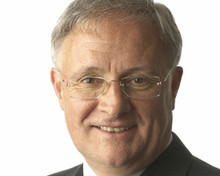
Speaking in Sweden today to mark its Public Service Day, Sir Michael Lyons, who is due to step down from the role in April, emphasised the importance of protecting the World Service's impartiality, and outlined the challenges facing the broadcaster's international efforts and the "tough decisions" being made, such as the recent service closures and job cuts at the World Service.
"Of course some argue that because the World Service is currently funded via a government grant, it must inevitably be a mouthpiece for British foreign policy. It's not, of course, and the BBC fiercely protects its editorial independence.
"But these concerns do shed light on both the difficulty and the importance of impartiality. After all, impartiality is an ongoing balancing act, not something that once attained can be forgotten. And a key part of the Trust’s work is to continually test impartiality and accuracy in order to reassure audiences that the BBC is editorially independent from both government and other commercial organisations.
"That's why the new arrangements agreed in the BBC licence fee settlement, while challenging, do have benefits. When the BBC takes on the responsibility for funding the World Service in 2014/15, it will then be even easier to demonstrate that the World Service is completely independent of government."
Today's speech also saw Lyons outline a new global strategy for the BBC, which was recently approved by the Trust following a review last year by the BBC Executive.
The broadcaster's new global strategy will be based on three main principles: firstly that the BBC brings the world to the UK by offering “the best ideas, talent and debate from around the world” to licence fee payers, that it brings the UK to the world by serving specific international audience needs and thirdly that it generates new financial value from BBC intellectual property, primarily fulfilled through BBC Worldwide, the BBC’s commercial arm.
Lyons stressed that these principles must apply in relation to audiences and customers alike, with the BBC's global mission being both editorial and commercial.
"Worldwide is very successful. For each of the last two years its sales have been more than £1bn. And its cash contribution to the BBC, including dividend and investment in programming, stood at £170 million in 09/10.
"This contribution will become increasingly important as we implement the tough new licence fee settlement."
But he warned that short-term financial need should never be put ahead of "the long-term imperative" for the BBC to protect its reputation for honesty and integrity.
"Now, given this pressing financial need, the temptation might be for the Trust to say to Worldwide: just let rip. Don’t worry too much about editorial or commercial principles. Invest in whatever will make the most profit and concentrate entirely on squeezing as much cash as you can from international markets so that we can maintain spending on the BBC in Britain. And some do argue just that.
"But the Trust believes that would be a very short-sighted decision. It would be an invitation to risk doing long-term damage to the BBC’s international reputation and possibly to our national reputation too.
"Following our review of the corporation’s commercial activities in 2009, we have taken a different direction. We are clear that our commercial activities are not an end in themselves. They must exist to support our public mission."
The global strategy adds that a new group of directors will take an overview across international activity in the future.
Free daily newsletter
If you like our news and feature articles, you can sign up to receive our free daily (Mon-Fri) email newsletter (mobile friendly).









